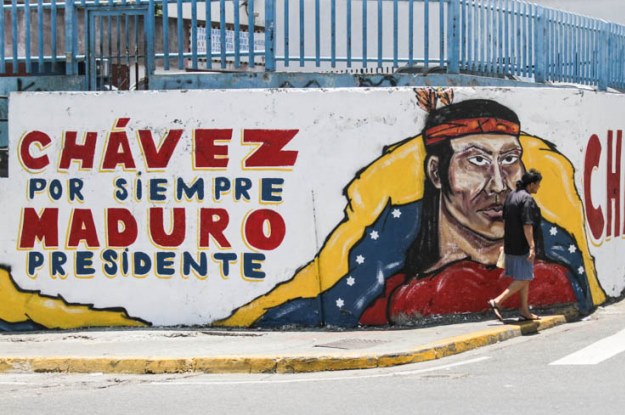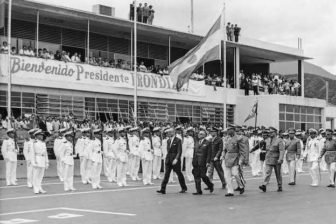You can call them Chávez acolytes, you can call them Bolivarians, just don’t call them pro-Maduro.
As Venezuela’s economy and institutions continue to deteriorate, long-running rifts within the country’s socialist left are becoming more apparent. Nowhere is this more evident than among a growing group of supporters of late former President Hugo Chávez who accuse the current president, Nicolás Maduro, of betraying the values of their “21st century socialist” movement.
Calling themselves “chavistas no-maduristas” or “chavistas críticos” (critical chavistas), this group claims to speak for some 15 percent of the country that, according to a recent Delphos poll, considers itself loyal to Chávez but opposed to Maduro’s rule.
Much like the rest of Venezuela’s opposition, these Chávez loyalists would like to see Maduro removed from office. While they didn’t participate when hundreds of thousands of anti-government protesters took to the streets of Caracas on September 1, they are becoming more organized – and vocal.
One of the main expressions of this movement is the Marea Socialista, a group associated with Chávez’s United Socialist Party of Venezuela (PSUV) until soon after Maduro took control. Heiber Barreto, a spokesperson for the group, told AQ that their intention is “to offer a new pro-Chávez alternative” for those loyal to the revolution.
“For the last two years, we have been inserting ourselves organically in chavista bases and popular movements,” Barreto said. The group’s application to be registered as an official party is pending.
And the Marea Socialista isn’t the only organized resistance to Maduro to come from chavista ranks. In July, Marea joined 14 other groups to create an alliance called the “Platform for the Fight of Chavismo and the Left.” Members range from former high-ranking government officials like former PSUV national leader Héctor Navarro and ex-defense minister Miguel Rodríguez Torres (who participated in Chávez’s failed coup attempt in 1992) to a scattering of community groups called “colectivos.”
“(The alliance) is the consecration of the true chavismo that exists even without Chávez,” said Barreto. “We want to desanctify the image of Chávez.” But when asked if chavismo would become more flexible, Barreto balked.
“No, no, no, no. Neither flexible nor pragmatic. Chavismo has its identity that will remain and exist always.”
That is to say, these chavistas no-maduristas will not consider themselves aligned with the traditional opposition any time soon. The group is largely in favor of the opposition MUD coalition’s effort to force a recall referendum against Maduro, but they fundamentally disagree that the Bolivarian Revolution and its accompanying policy prescriptions are the cause of the current crisis; they label the MUD as a “leadership of swindlers.”
That hasn’t stopped opposition leaders from trying to connect with potential anti-Maduro, pro-Chávez voters. “Those who voted for our option, and those who didn’t, suffer for the same reasons. We should all walk together out of this pain,” the general secretary of the MUD said in a recent speech.
Yet efforts to enlist their support will need to go further. The unresolved 15 percent from the Delpho poll is craving a leadership that makes them feel protected and safe, Félix Seijas Rodríguez, director of Delphos, told AQ. “They’ll align with whoever gives them that, be it the MUD or the chavistas críticos.”
It is still unclear what side of the political spectrum will fill the void when and if Maduro is removed from power. The nature of a change in the political landscape after his rule will depend on how long a recall vote is delayed, whether or not dissent arises within the country’s institutions, and the extent to which the critical chavistas are able to differentiate themselves from the current government.
But the truth is that chavismo has never been monolithic, according to John Magdaleno, a political analyst and director of consulting firm Polity. “(There are) moderates versus radicals, militarists versus civilists, and pro-Cuban versus nationalists,” Magdaleno told AQ. With the charismatic Chávez alive and oil prices high, those rifts remained dormant. “Now, with the absence of both… it’s hard to maintain cohesion,” he said.
That Marea Socialista is now accompanied in its criticism of Maduro by such a diverse range of players suggests that a significant bloc within chavismo is trying to salvage its brand. According to Venezuelan political journalist Ángel Arellano, the reason for that may not be solely ideological. “Critical chavistas are trying to free themselves from responsibility for the crisis, to be able to present themselves in the future as the ‘possible chavismo,’” he told AQ.
This may help explain why these anti-Maduro chavistas are becoming more vocal now. As journalist Luz Mely Reyes argued in a recent article for Venezuelan news site Efecto Cocuyo, the longer that this incarnation of chavismo stays in power, the harder it will be for it to come back in the future.
These groups are struggling to avoid the erosion of their leader’s legacy, especially since they don’t align squarely with the opposition. But the increasingly public tenor of their criticism makes one thing clear: chavismo, in one form or another, likely isn’t going anywhere.
“I don’t believe in the end of chavismo,” Luis Vicente León, an analyst and director of the Datanálisis poll, told AQ. “People tend to confuse the pulverization of Maduro and the PSUV with the end of chavismo. But I believe we’ll keep talking about it for many, many years.”
—
Krygier is a Venezuelan journalist and editorial intern for AQ.








